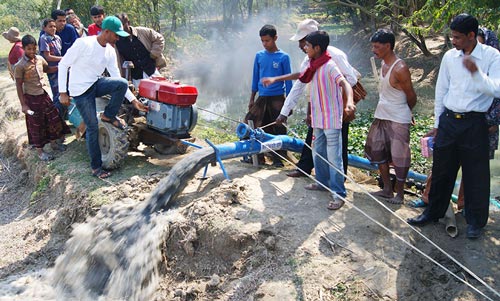
In south-western Bangladesh, the world’s largest delta with plentiful fresh surface water, more than 600,000 hectares of land are fallowed without crop in the dry season.
Responding to this problem, CIMMYT and International Development Enterprises (iDE) are pleased to announce the initiation of the Cereal Systems Initiative for South Asia-Mechanization and Irrigation (CSISA-MI) project to sustainably intensify cropping on fallow and low-productivity lands. This US$13-million, five-year project, supported by the Feed the Future Initiative and administered by the USAID mission in Bangladesh, was launched on 1 July 2013.
CSISA-MI is a sister initiative falling under the CSISA-Bangladesh program, connecting CIMMYT, IRRI, and WorldFish as partners. The MI initiative aims to unlock agricultural productivity in southern Bangladesh by conducting research and market development to increase the availability and adoption of resource-conserving irrigation equipment, and to scale farm machineries to respond to rural labor scarcity and high costs, while also encouraging crop management practices based on conservation agriculture (CA). Southern Bangladesh is constrained by numerous factors, including farmers’ inability to invest in resource-conserving and productivity-enhancing machinery, high cost of water pumping, and lack of awareness about the potential for dry season crops like wheat, maize, sunflower, and legumes.
CSISA-MI responds to these problems by developing smart business models to link farmers with agricultural service providers, and service providers with machinery and irrigation equipment dealers, to boost the use of irrigation and machinery for CA throughout the region. The project will also bridge the gap between the public and private sectors by facilitating partnerships with the government of Bangladesh and private sector partners engaged in irrigation, agricultural mechanization, and extension.
CSISA-MI will create broad access to low-cost surface water irrigation and smart agricultural machinery and other services to enable farmers to optimize water, labor, time, seed, and fertilizer use in their fields during the dry season. Research topics will focus on the improvement of irrigation water use efficiency and agricultural water management as well as enhancement of the use of fuel-saving axial flow pumps (AFPs) and other equipment for surface water irrigation. Further research and the development of value chains will focus on seed-fertilizer drills compatible with two-wheeled tractors for strip tillage, bed planters, multi-crop reapers, and rice transplanters used to reduce turn-around time between crops.
Machineries and cropping practices will be fine-tuned to the diverse agro-ecological conditions of the region through on-farm action research and experimentation in farmers’ fields. CSISA-MI harnesses the power of the market to align incentives toward large-scale, smart-technology adoption. The initiative has already made significant progress. Memorandums of Understanding (MoUs) with leading firms, including RFLP ran Group and ACI Agribusiness, have been signed to accelerate the commercial availability of AFPs, bed planters, and seed-fertilizer drills.
 Climate adaptation and mitigation
Climate adaptation and mitigation